Kultur in Gefahr - ITI
Kultur in Gefahr - ITI
Kultur in Gefahr - ITI
Create successful ePaper yourself
Turn your PDF publications into a flip-book with our unique Google optimized e-Paper software.
10 Artistic Expression <strong>in</strong> a Corporate World<br />
Artistic Expression <strong>in</strong> a Corporate World 11<br />
development policies; (c) reverse trends to reduce the number of decisionmakers<br />
at a time when the media’s public is grow<strong>in</strong>g larger and the impact<br />
of communication is <strong>in</strong>creas<strong>in</strong>g; (d) reduce the <strong>in</strong>fluence of advertis<strong>in</strong>g<br />
upon editorial policy and broadcast programm<strong>in</strong>g; (e) seek and improve<br />
models which would ensure greater <strong>in</strong>dependence and autonomy of the<br />
media concern<strong>in</strong>g their management and editorial policy, whether these<br />
media are under private, public or government ownership.’ (MacBride<br />
1980: 266).<br />
Unesco was not allowed the time to make more concrete, and<br />
formulate, and possibly encourage the implementation of such legal<br />
<strong>in</strong>struments that would favour what we would nowadays call cultural<br />
diversity. From the end of the 1970s on, the US did two th<strong>in</strong>gs. First, it<br />
fulm<strong>in</strong>ated aga<strong>in</strong>st the idea that <strong>in</strong>formation and cultural policies would be<br />
designed that would h<strong>in</strong>der the so-called “free flow of <strong>in</strong>formation”. Of<br />
course, freedom of expression is an important value, as long as it is a<br />
freedom for everybody to communicate. The “free flow of <strong>in</strong>formation”<br />
pr<strong>in</strong>ciple, however, mixed up economic and cultural freedom. The<br />
economic freedom might result <strong>in</strong> the extremely strong market positions of<br />
just a few cultural conglomerates that push aside the production,<br />
distribution, promotion, and reception opportunities of many other<br />
different cultural <strong>in</strong>itiatives. This is what was happen<strong>in</strong>g <strong>in</strong> the 1970s and<br />
the newly <strong>in</strong>dependent countries suffered the most from this “free flow of<br />
<strong>in</strong>formation” pr<strong>in</strong>ciple and practice.<br />
The idea of a New World Information and Communication Order<br />
tried to reverse this trend. The demands became clear, and it was time to<br />
take the next step, to formulate concrete policies on a global scale and the<br />
place to do so was with<strong>in</strong> Unesco. The development of alternatives for the<br />
“free flow” pr<strong>in</strong>ciple and practice is exactly what the US strongly opposed,<br />
and <strong>in</strong> the end this cultural superpower left Unesco. We write the 1st<br />
January 1985. This was the deathblow of the New World Information and<br />
Communication Order.<br />
The United States did a second th<strong>in</strong>g at the same time as it was<br />
prepar<strong>in</strong>g its withdrawal from Unesco. It had another new world order <strong>in</strong><br />
m<strong>in</strong>d, a new world order of “free markets” economics. Jerry Mander writes<br />
that this neoliberal agenda would oblige countries, for <strong>in</strong>stance, to open<br />
their markets to foreign trade and <strong>in</strong>vestments without requir<strong>in</strong>g a majority<br />
<strong>in</strong> local ownership; elim<strong>in</strong>at<strong>in</strong>g all tariff barriers. It would severely reduce<br />
government spend<strong>in</strong>g, especially <strong>in</strong> areas of services to the poor; convert<br />
small-scale-self-sufficient family farm<strong>in</strong>g to high-tech, pesticide-<strong>in</strong>tensive<br />
agribus<strong>in</strong>ess that produces one-crop export commodities such as coffee.<br />
And it would demonstrate an unwaver<strong>in</strong>g dedication to clear<strong>in</strong>g the last<br />
forests, m<strong>in</strong><strong>in</strong>g the last m<strong>in</strong>erals, divert<strong>in</strong>g and damm<strong>in</strong>g the last rivers, and<br />
gett<strong>in</strong>g native peoples off their lands and resources by any means<br />
necessary. (Mander 1993: 19).<br />
The moment that Unesco became toothless, a new round of<br />
negotiations <strong>in</strong>side GATT, the Uruguay Round, started. It had trade<br />
liberalisation as its ma<strong>in</strong> aim more than ever before, result<strong>in</strong>g <strong>in</strong> the<br />
establishment of the WTO <strong>in</strong> 1995, with some new treaties, like GATS (the<br />
General Agreement on Trade and Services) and TRIPs (the agreement on<br />
Trade Related Aspects of Intellectual Property Rights). In 1993 Mart<strong>in</strong><br />
Khor foresaw that this liberalisation would accelerate the evolution of<br />
monocultures. Governments would f<strong>in</strong>d it <strong>in</strong>creas<strong>in</strong>gly difficult to regulate<br />
or prevent cultural and service imports. ‘S<strong>in</strong>ce the largest and most<br />
powerful enterprises belong to the North, the already rapid spread of<br />
modern Western-orig<strong>in</strong>at<strong>in</strong>g culture will be accelerated even more. Cultural<br />
diversity would thus be rapidly eroded.’ (1993: 104). A decade later we<br />
may conclude that this is true and not true. The cultural conglomerization<br />
is progress<strong>in</strong>g, month after month. At the same time multitudes of cultural<br />
<strong>in</strong>itiatives of artists, associations and small enterprises take place,<br />
everywhere <strong>in</strong> the world, day after day. (Smiers 2003: 88-102).<br />
Thus the challenge is to give those <strong>in</strong>itiatives ample space and<br />
opportunity, because this diversity is what we need from a democratic<br />
perspective. Second, the presence and power of cultural conglomerates<br />
should be reduced substantially. Otherwise, it becomes nearly impossible<br />
to get access to the ma<strong>in</strong> channels of cultural communication - which is a<br />
basic human right. (See later <strong>in</strong> this chapter).<br />
The issue of how to deal with the free trade negotiations that would<br />
affect cultural diversity came up <strong>in</strong> Canada first. Around 1986 this country<br />
became <strong>in</strong>volved <strong>in</strong> preparatory discussions with the US about liberalis<strong>in</strong>g<br />
their markets for each other. It quickly became clear at the political level <strong>in</strong><br />
Canada that there was to be an impact on the cultural sovereignty of the<br />
country. This became a serious political issue, perhaps strangely enough<br />
more <strong>in</strong> Ontario than <strong>in</strong> Québec. In Ontario many people were concerned<br />
about the cultural aspect because they are Anglophone and were much<br />
more <strong>in</strong>vaded by American programmes than was the case <strong>in</strong> Francophone<br />
Québec. There, for <strong>in</strong>stance, the most popular television programmes were<br />
made <strong>in</strong> Québec, while <strong>in</strong> the rest of Canada n<strong>in</strong>e out of ten programmes<br />
came from the United States. Nevertheless, the free trade agreement



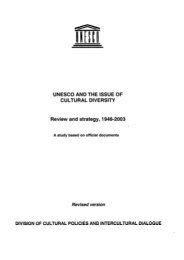
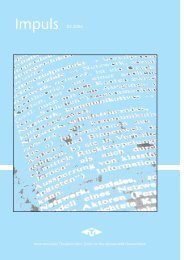
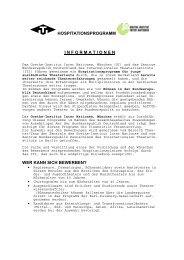

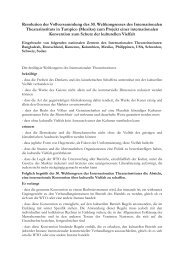
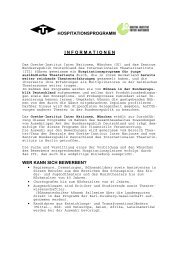
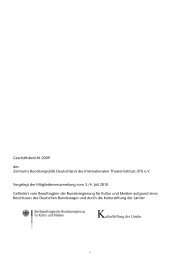
![Geschäftsbericht 2010 [pdf 2 MB] - ITI](https://img.yumpu.com/4380475/1/184x260/geschaftsbericht-2010-pdf-2-mb-iti.jpg?quality=85)